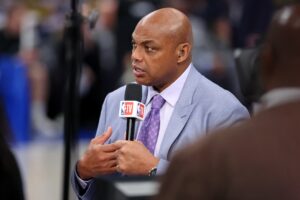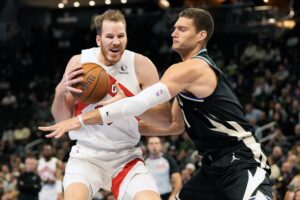If it wasn’t so blatantly self-serving, the sliding scale of NBA owners who are fine with super-teams or against them would be pretty hilarious. When LeBron James left to take his talents to South Beach, Cleveland Cavaliers owner Dan Gilbert spearheaded the campaign against the immorality of super-teams. Given what his team is now, any of his quotes on the issue then, he might as well have spoken in comic sans voice (if such a thing were a “thing”). Same goes for the Golden State Warriors ownership. But being on a super-team is good for a player’s brand, so it’s not going away on its own. It’s time for NBA owners to bite the bullet; it’s time to scrap the NBA’s salary cap and max contracts.
NBA’s Salary Cap and Max Contracts Are Not Working
Max salaries are nothing more than owners wanting to drive down the cost of the labor force. In theory, it’s the same idea that has shipped so many American manufacturing jobs overseas. The only wrench in that plan as it pertains to the NBA is that owners can’t find near-slave labor in a third-world country that could effectively replicate LeBron James or Steph Curry for pennies on the dollar. The NBA’s salary cap and implementation of max contracts goes against the fundamental idea of American capitalism: you get paid what the free market sets your worth at. The NBA is not a free market system anymore, and really never was.
We don’t know what LeBron James is worth because the NBA has set a limit to his earning power. It’s not crazy to think in a true free market NBA superstars could make upwards of $75 million per season. Put yourself in James’ position (or take off some zeroes in the numbers and apply it to your own situation), having your paycheck halved because your employer made rules to limit your income would be infuriating.
The Player Hierarchy
When Harrison Barnes – who was somewhat of a punch-line towards the end of his time with the Warriors – signs a deal worth roughly as much as Kevin Durant’s, the business model is fundamentally flawed. It’s kind of amazing how the NBA owners control the vast majority of the rules, they set up the rules to give themselves as much protection as possible, yet, they can’t help themselves from doling out dumb contracts.
The ultimate display of NBA irony was how vigorously small market owners voted for change to the NBA’s Collective Bargaining Agreement after they saw what James, Dwyane Wade, and Chris Bosh did with the Miami Heat, only to watch it be one of the causes that led the Oklahoma City Thunder (the NBA smallest market) to trade James Harden.
Every time free agency starts, the NBA fan base collectively says “Wait, that guy is gonna make how much?” dozens of times. It leads for the likes of Durant and company to look elsewhere while their earning power is at a premium. And also look for shoe deals to cemented their place in the NBA hierarchy. And those deals being worth more than what teams are paying players is becoming standard practice.
The NBA Needs the Players More than It Needs the Owners
With a few possible exceptions, NBA owners would seem to be oblivious to the fact that their insistence on limiting contracts is at the crux of the super-team “problem.” That is, if one subscribes to the idea of it being a problem. Nike now has one of its premier stats on the NBA’s most talented team. And they also can make a dent in the Steph Curry Under Armour sales in the process. Durant going to the Warriors was good for Durant’s brand. It was good for the Warriors, it was good for Nike.
Nike is now paying players as much as NBA teams. This creates a problem for the NBA, it reinforces all the criticisms of the AAU-ization of basketball. It promotes the brandizing of players over team(s). Superstars are forced to look at their options and ask “I’ll make about the same if I stay or leave, so why not go to the loaded team?”
There’s little to no chance the Warriors would have seen Durant as a viable option if Golden St. was forced to look at their team under a true free market system. The salary cap – and max contracts – allowed it to happen. If Golden St. saw Curry’s contract coming down the pike, no way they pony up what it would have taken to sign Durant. Unless they were willing to spend $300 million or more on payroll. (And if they were, more power to them.)
It’s In the Shoes
A player’s standing in the NBA hierarchy is tied to shoe sales; unlike other sports, because you can’t wear spikes in the street. The NBA has to nip this in the bud before it gets out of control. Eliminating the NBA’s salary cap and max contracts is the easy solution.
If taking less NBA money means making easier to win a championship and sell more shoes, why not? The owners fear player empowerment, and legislate against it. So the players seek empowerment elsewhere. They’re getting it from agents and shoe companies.
Siding with Billionaires Over Millionaires
The average fan consistently (and confusingly) sides with management over labor when, if presented with a comparable scenario in their own lives, they’d undoubtedly side with their fellow laborer over their company’s CEO. If the NBA’s salary cap goes away, there will predictably be arguments of “the big markets will take over.” You know, all the stuff we hear about the wrongs of baseball. The dirty secret though, is that with all the NBA’s salary cap loopholes it currently has, the big market teams already have an advantage.
Why is Average Joe Sports Fan so adamant about the free market in the real-world economy but so strident in protecting the socialization of professional sports? Salary cap or no, the big markets will always have advantages, but also detractors (like big-city living expenses). A true free market also encourages innovation among the small markets, and that can benefit the entire league.
A Smarter League
The Oakland A’s implemented “Moneyball” not because they necessarily wanted to, but because they had to in order to compete. It resulted in a more advanced sport in general. And when their manner of thinking became more mainstream, it made the sport’s fan base more knowledgeable.
Like baseball, not having a hard cap does not mean the sport will dissolve into the wild wild west. Players will still value role. It’s not like a team could just build an equivalent to the Team USA Olympic team. Draymond Green is not signing somewhere to the be 11th man. Further, a softer cap could ultimately be the bridge between the two extremes. It would not necessarily require a set number that teams have to get under. A heavy tax would get imposed on teams that go over. But teams would have the option to go over. That tax money would get distributed amongst the other teams.
Millionaire players do not need any sympathy. But it’s not really about money. It’s about the principle of the system in question. The same extension of benefit of the doubt should be given to the millionaire players as the billionaire owners. The NBA needs the players more than it needs the owners. It’s time for the NBA to embrace the free market. The NBA’s salary cap and max contracts need to go away. Otherwise, we are nearing a time when shoe companies dictate NBA transactions. We might be there already.
Main Photo






